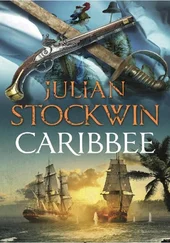Julian Stockwin - Conquest
Здесь есть возможность читать онлайн «Julian Stockwin - Conquest» весь текст электронной книги совершенно бесплатно (целиком полную версию без сокращений). В некоторых случаях можно слушать аудио, скачать через торрент в формате fb2 и присутствует краткое содержание. Жанр: Старинная литература, на английском языке. Описание произведения, (предисловие) а так же отзывы посетителей доступны на портале библиотеки ЛибКат.
- Название:Conquest
- Автор:
- Жанр:
- Год:неизвестен
- ISBN:нет данных
- Рейтинг книги:5 / 5. Голосов: 1
-
Избранное:Добавить в избранное
- Отзывы:
-
Ваша оценка:
- 100
- 1
- 2
- 3
- 4
- 5
Conquest: краткое содержание, описание и аннотация
Предлагаем к чтению аннотацию, описание, краткое содержание или предисловие (зависит от того, что написал сам автор книги «Conquest»). Если вы не нашли необходимую информацию о книге — напишите в комментариях, мы постараемся отыскать её.
Conquest — читать онлайн бесплатно полную книгу (весь текст) целиком
Ниже представлен текст книги, разбитый по страницам. Система сохранения места последней прочитанной страницы, позволяет с удобством читать онлайн бесплатно книгу «Conquest», без необходимости каждый раз заново искать на чём Вы остановились. Поставьте закладку, и сможете в любой момент перейти на страницу, на которой закончили чтение.
Интервал:
Закладка:
Ryneveld pronounced a Dutch blessing on the meal and raised his eyes. ‘Our humble repast – a bobotie only,’ he said quietly. ‘Haasje, do help Mr Secretary Renzi to a portion.’
Renzi enjoyed the spicy dish, meat studded with dried fruit and nuts and topped with a savoury custard. It was clearly a family favourite.
After dinner, the men retired to the library, a discreet and well-appointed room. Renzi stood admiring the volumes while Ryneveld found a bottle with a wax-sealed cork and opened it carefully. ‘A Cape liqueur, made with the skin of the naartjie fruit and orange blossom.’ Two glasses were produced and filled. ‘And named after Admiral van der Hum of the Dutch East India Company who did so admire it.’
The thick golden liquid had a tantalising tangerine flavour but was very sweet. ‘A little too sticky? Then we’ll add some brandy.’
Ryneveld was the perfect host and Renzi relaxed in his company. Here was a man of the world, an acute observer, whose interest in his guest was not contrived and who took an intelligent pleasure in the discussion of philosophies and the arts.
But the talk petered out when Ryneveld’s manner turned grave and introspective.
‘The grain famine?’ Renzi asked, with concern.
At first the man did not answer, then said woodenly, ‘For your nation, if this affair turns out against you then you’ll sail away. For me, I shall be left to answer for my conduct.’ He set down his glass very carefully. ‘Until now we’ve been able to console ourselves that we have our independence, but for all that, we must understand that we are merely holding the colony for Bonaparte.’
‘He’s still “protecting” the Netherlands, I gather.’
‘The French Army occupies the Low Countries,’ Ryneveld agreed, ‘but the Batavian Republic forced on us in imitation of the glorious French Revolution is still headed by our own Grand Pensionary Schimmelpenninck, who stands staunch.’
‘You’re concerned for the mother country,’ Renzi said sympathetically.
‘I am – but this is not what disturbs me. I was recently given some very unpleasant news concerning it that directly affects us here.’
‘Oh?’ Renzi felt the warmth of the wine fall away.
‘What I have heard confidentially is nothing less than that Napoleon will shortly end the Dutch Republic and place his own brother, Louis, on the throne of Holland in contempt of all the principles of the revolution.’
It was a bombshell. Presumably there was now nothing that could prevent the French taking formal possession of the Dutch colony for themselves.
With a cynical smile Ryneveld continued, ‘It’s always been said that the Cape is a feather in the hands of the Dutch and a sword in the hands of the French. You can be sure that, now the way is clear, they’ll stop at nothing to recover it!’
Renzi’s mind raced. Baird must know of this, of course, but it left him in a frightful situation. Within days of taking possession he faced two major problems: an army still in the field opposing him and the pressing need to reduce numbers by sending away a large proportion of his troops. Would his fragile defences hold against a determined assault?
‘I’m no soldier,’ Ryneveld said, ‘but I’d think that the advantage must still lie with you as defender.’
‘Possibly,’ Renzi said, with a wry smile. ‘Yet Cape Town fell to us, you’ll agree.’
‘Of course. Your commanders will probably know by now that we were much outnumbered. Goewerneur Janssens did what he could, but who is able to stand against those devilish Highlanders? No, with a professional general of the army at its head, the defenders will make good account of themselves. I suspect that General Baird will want to fall back on the defences of the castle and town – with your ruling of the seas he will not be in want of supply.’
So much depended on Popham – and here such a tiny force to set against a determined foe. ‘The Navy will do its duty,’ Renzi found himself saying.
‘I’m sure it will, if only to honour its great Admiral Nelson. Yet the gravest threat is not to be met on the ocean waves – it is here.’
‘The people?’
‘Quite. There are those who would be rid of the English, who would think it a duty to take cause with any who could overthrow you.’
‘May I know . . . ?’
‘I will tell you.’ Ryneveld sipped his liqueur. ‘The feeling among the general populace is that the French will soon return and overthrow you. These people will fear retaliation for having collaborated and will be reluctant to fall in with you. But the good people of Cape Town, those of property and standing – those we call the Cape Dutch – will see a settled and prosperous future under the free-trade rule of the British as much to be preferred, especially should you stand by your promise to abide by the old laws and customs. They’re tired of being cut off from the world, threatened with wars and upheaval not of their making. You’ll have no trouble from them.
‘They are in small numbers, though. Even counting the lesser sort, the population is only some six thousand, and outnumbered therefore by the slaves who, if you take the rural as well, are some twenty, possibly thirty thousand. These are the Cape Malays from Java, others from Madagascar and the east of Africa, but never from the south. Now, if some hothead or provocateur stirs them up I’ll leave you to consider the consequences.
‘But it’s the folk of the country, the boeren , whom you must never trust. They are poor, hard, uncouth and restless – and therefore well suited to existence up-country, at the edge of civilisation. You must understand that, since the early days of the VOC – the Vereenigde Oost-Indische Compagnie – which is our Dutch East India Company who founded the colony at the Cape, they’ve always been rebellious and hostile to rule.
‘When the last Stadholder of the Netherlands fled before the French Revolution to England, it was the Boers who supported the Batavian Republic against the VOC here. They’ll have no love for a country that shelters the old enemy. And know that they’re the core of Janssens’s army, some of the best irregular mounted troops anywhere, and loyal only to him.’
Ryneveld picked up his glass again and looked shrewdly at Renzi. ‘So what we must say, Mr Secretary, is that you have made conquest, but how long will you be able to hold it?’
‘And so I give you a toast. Gentlemen – t’ Billy Roarer as is Neptune’s right royal favourite!’ Gilbey spluttered, red-faced and happy.
‘Which is to say includes her noble crew of souls,’ Curzon said languidly, knowing it would niggle the first lieutenant, whose efforts to deny his own humble origins led him to keep Jack Tar at a snarling distance.
‘And never overlooking the Royals,’ Kydd came in, with a gracious nod to Clinton, the young lieutenant of marines, who blushed and raised his glass in return to his captain.
L’Aurore had now rounded southern Africa and was standing out into the Indian Ocean in flying-fish weather, bound for Lourenço Marques and utterly in her element.
Bowden, as Mr Vice and having acquitted himself of the duty of the royal toast, now joined in the merriment. ‘Damme, but Mossel Bay was well done, sir!’ He chuckled. Their bloodless success there would never make it to the history books but it was the tonic the ship’s company needed to put behind them the grim scenes with Bato .
He posed, theatrically hanging his head and intoned:
When first on board this ship I went ,
My belly full, my mind content –
No sorrow touched my heart:
I view’d my coat, so flash and new ,
Читать дальшеИнтервал:
Закладка:
Похожие книги на «Conquest»
Представляем Вашему вниманию похожие книги на «Conquest» списком для выбора. Мы отобрали схожую по названию и смыслу литературу в надежде предоставить читателям больше вариантов отыскать новые, интересные, ещё непрочитанные произведения.
Обсуждение, отзывы о книге «Conquest» и просто собственные мнения читателей. Оставьте ваши комментарии, напишите, что Вы думаете о произведении, его смысле или главных героях. Укажите что конкретно понравилось, а что нет, и почему Вы так считаете.









